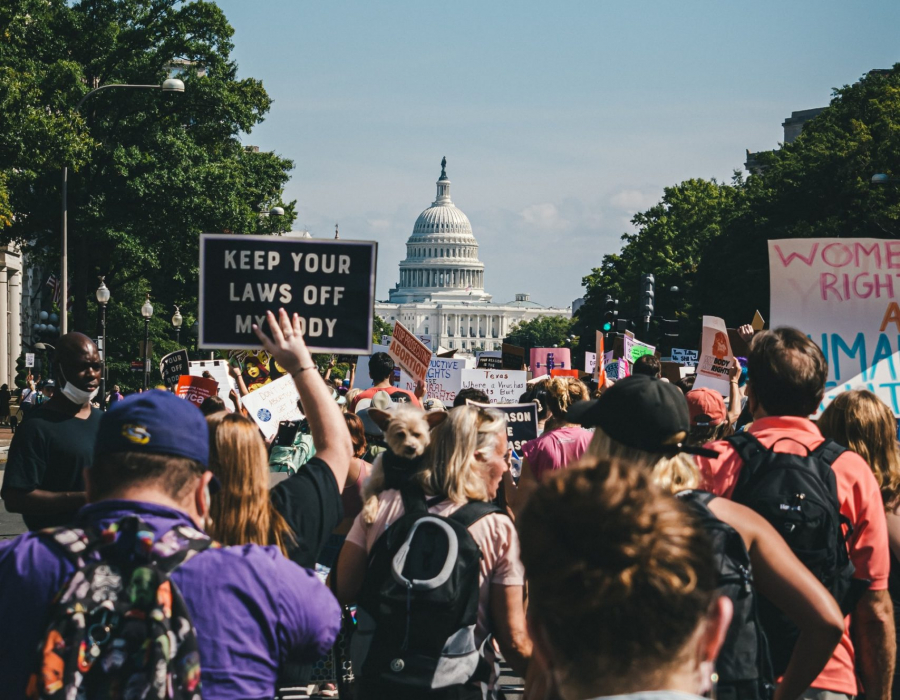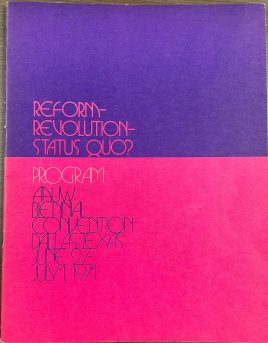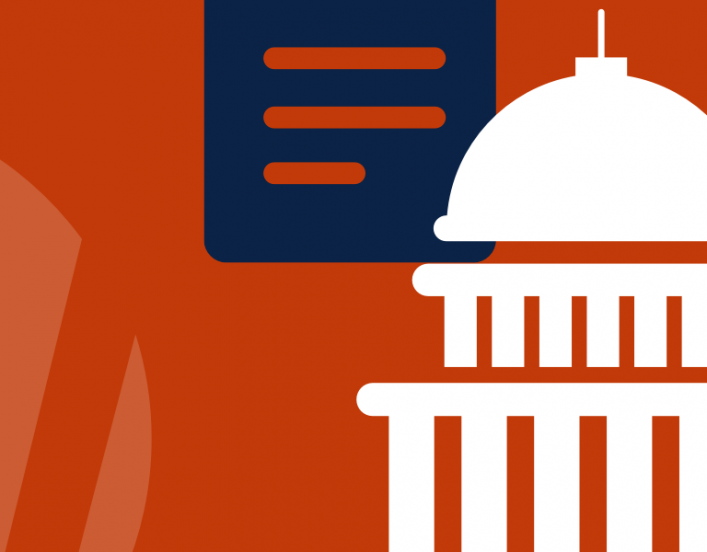Rallying for Reproductive Rights

The Fight Continues
The U.S. Supreme Court’s 1973 ruling in Roe v. Wade established abortion as a constitutionally protected right. However, the promise of Roe v. Wade has never been a reality for all, and abortion rights have been under attack ever since. AAUW strongly condemns the U.S. Supreme Court’s decision in Dobbs v. Jackson Women’s Health Organization. AAUW believes everyone has the right to make decisions about their own reproductive lives without government interference. Abortion access is vital to women’s ability to control their lives, bodies and futures. Without reproductive freedom, there can be no equity.
What Comes Next
AAUW’s Public Policy team is working closely with coalition partners to direct our members on the best next steps. In the meantime, here’s what you can do to fight for reproductive freedom.
- Support legislation like the Women’s Health Protection Act (WHPA). This critical bill would take the principles of Roe v. Wade and make them federal law; unfortunately, it did not pass the U.S. Senate. As public outcry continues to grow opposing the overturning of Roe v. Wade, federal legislation would provide critical protection for the right to abortion.
- Learn Where We Stand. The protection of reproductive rights—including access to contraceptive care, abortion, sexual health education and family planning services—has been an unwavering AAUW policy principle since 1977. Access to abortion is not only a fundamental right, it is critical to a woman’s ability to control her life, her body and her future. Expanding reproductive services increases women’s prospects of attaining economic security. Moreover, attacks on reproductive rights are especially harmful in a country that lacks policies to make parenthood and pregnancy safer, including accessible maternal health care, paid leave, child care and workplace protections for pregnant workers.
- Take action in the states. Learn more about the status of abortion access in your state with the Guttmacher Institute’s 2022 policy analysis. Take the opportunity to meet with your representatives on your home turf and hold in-district meetings to share your thoughts when Congress heads into recess in August.
- Get Involved. Times of crisis often inspire a surge in activism, and we encourage both longtime advocates and new supporters to make their voices heard. Read more about what you can do, including contacting your elected officials, writing a letter to the editor, and engaging in community forums. Engage with the Bans Off Our Bodies coalition efforts and check for an event near you!
AAUW & Reproductive Rights
Being able to choose whether and when to become a parent improves women’s well-being and fosters economic security—a crucial component of AAUW’s mission. In the 1970s, the legalization of abortion led to women’s increased participation in the workforce, particularly among Black women. The ability to control when to start a family has also been linked to significant increases in women’s wages and increased likelihood of educational attainment. Moreover, access to abortion improves outcomes for the next generation—studies have shown that children born to women with abortion access had lower rates of poverty and were more likely to graduate college.
Access to abortion and reproductive health services, maternal health care, paid leave and paid sick days, affordable child care, and workplace protections for pregnant workers are essential for women to be able to control their lives and attain economic security. However, the 26 states that have banned or are poised to ban abortion are largely those with the lowest minimum wages, and none offer any universal forms of paid leave. Low-income women, women of color, and women with disabilities will be especially harmed as they are disproportionately likely to live in those states, and already face substantial barriers to accessing reproductive services and health care.
AAUW has fought for the protection of reproductive rights for decades, through public campaigns, legal briefs, and legislative advocacy at the state and national level. Learn more about AAUW’s history and continued advocacy for reproductive freedom below.
- 1920: the Association served on the U.S. Public Health Service Advisory Council of the Division of Venereal Diseases, dealing with the effects on women of a campaign to control venereal diseases
- 1935: the Association Legislative Program advocated for the legalization of the dispensing of contraceptive information by physicians.
- However, it was dropped in 1939 due to the controversy it raised among some members.
- 1970: AAUW-Hawaii launched a successful drive to repeal the state’s restrictive abortion laws, stimulating AAUW’s involvement in similar campaigns in other states.
- 1971: at the Association’s convention a resolution was adopted calling on members in all 50 states to work for repeal of restrictive abortion laws, essentially advocating to legalize abortion with medical consultation.

Cover of program from 1971 AAUW Convention in Dallas - 1971: AAUW joined an amicus brief in the U.S. Supreme Court case Roe v. Wade.
- 1973: AAUW joined an amicus brief in the Supreme Court case Doe v. Bolton. The Court’s decision, which came down on the same day as Roe, overturned a Georgia law that had outlawed abortion in most cases.
- 1975-1976: AAUW opposed the Hyde Amendment, which restricted the use of Federal Medicaid funds on abortion unless the woman’s life was in danger, several times.
- AAUW also opposed the subsequent versions of the Helms & Hyde Amendment introduced in 1981 and 1985.
- 1977: AAUW adopted the protection of reproductive rights as a policy principle.
- 1980: AAUW petitioned the Harris v. McRae ruling that “neither the federal government nor the states are required in any way by the Medicaid program or the Constitution to pay for the ‘medically necessary’ abortions of Medicaid recipients.”
- 1989: AAUW initiated the AAUW Campaign for Choice (CFC) in response to the U.S. Supreme Court decision in Webster v. Reproductive Health Services, which upheld the constitutionality of several state-level restrictions on abortion. Through the CFC, AAUW took a lead nationwide in fighting for reproductive rights for all women.
- 1991: The Supreme Court ruled in Rust v. Sullivan to uphold the 1987 Department of Health and Human Services regulation prohibiting employees of federally-funded family planning facilities from providing abortion information. AAUW signed on to Planned Parenthood’s emergency campaign, held events, encouraged our members to contact their representatives and donate, and advocated for freedom of speech and safe family planning.
- This work begins AAUW’s advocacy against both domestic and international “gag rules,” which have limited access to abortion globally. The global gag rule, or Mexico City Policy, is an executive order that changes with each administration. It prohibits organizations using international family planning funds from providing abortion-related services, even with their private money.
- 1992: AAUW launched a second AAUW CFC in response to the Supreme Court’s decision in Planned Parenthood of Southeastern Pennsylvania v. Casey, which refined the decision in Roe and created a new “undue burden” standard to evaluate laws restricting abortion care.
- 1993-1994: AAUW campaigned for comprehensive health care reform and fought to ensure that any legislative response included coverage for the full range of reproductive health services.
- 2000: AAUW supported the Murray-Snowe Amendment to the DOD Authorization bill to restore U.S. servicewomen’s “right to privately funded abortion services in military hospitals overseas.”
- 2000: AAUW worked to protect the FDA approval of mifepristone (RU-486), used in medication abortions, from political interference.
- 2001: AAUW opposed and lobbied against the Helms Emergency Contraception Amendment, which prohibited “the use of federal funds to prescribe, distribute, or provide emergency contraception to minors in elementary and secondary schools in school-based health care centers.”
- 2006: AAUW joined an amicus brief in the Supreme Court case Ayotte v. Planned Parenthood of Northern New England. The Court ruled that a New Hampshire abortion law, which had restricted abortions without a medical emergency exemption, was unconstitutional.
- 2007: AAUW advocated for the passage of the Freedom of Choice Act (FOCA), a bill that would guarantee “every woman has the fundamental right to choose to bear a child; terminate a pregnancy prior to fetal viability; or terminate a pregnancy after viability when necessary to protect her life or her health.”
- AAUW also led the charge with earlier versions of this bill in 1989, 1992, and 2003.
- 2007: AAUW joined an amicus brief in the Supreme Court cases Gonzales v. Carhart and Gonzales v. Planned Parenthood Federation of America, Inc. The Court ruled to uphold the Partial-Birth Abortion Ban Act of 2003.
- 2012-2013: AAUW opposed the Pain-Capable Unborn Child Protection Act, which would limit abortions after 20 weeks.
- 2014: AAUW joined an amicus brief in the Supreme Court case Burwell v. Hobby Lobby. The Court’s decision allowed certain corporations to deny birth control coverage on the grounds of religious freedom.
- 2016: AAUW joined an amicus brief in the Supreme Court case Zubik v. Burwell. The Court’s decision created ambiguity over contraceptive coverage in religious nonprofit organizations.
- 2017: AAUW opposed the No Taxpayer Funding for Abortion and Abortion Insurance Full Disclosure Act of 2017 (H.R. 7), which would create burdensome regulations for insurers to cover abortion services.
- 2019: AAUW joined an amicus brief in the Supreme Court case June Medical Services LLC v. Gee (now June Medical Services LLC v. Russo). The Court struck down the Louisiana law that required doctors who perform abortions to have admitting privileges at a nearby hospital, which imposed unnecessary regulations on abortion access.
- 2021: AAUW joined an amicus brief in the Supreme Court case Dobbs v. Jackson Women’s Health Organization. The Court ruled to uphold Mississippi’s 15 week abortion and overturned Roe v. Wade.
Related
Where We Stand: Reproductive Rights

